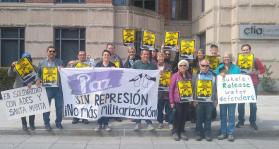As elections approach, Members of Congress express concern over human rights violations and democratic backsliding
U.S.-based human rights organizations echo concerns, call for U.S. government to take “principled” action to “protect essential rights”
Washington, DC - On Tuesday, fourteen Members of Congress, including Ranking Democrat on the House Foreign Affairs Subcommittee on the Western Hemisphere, Joaquin Castro, and leaders of the Progressive Caucus, sent a letter to the U.S. Department of State expressing “significant concerns regarding democratic backsliding and an increase in reports of human rights violations in El Salvador.”
Regarding the upcoming February 4 presidential and legislative elections, in which Nayib Bukele is running for an unconstitutional repeat term, they stated that “the Salvadoran constitution is unambiguous in its prohibition on serving consecutive terms as President, and Bukele is only able to run due to a ruling made by judges appointed by lawmakers from the President’s ruling party after the removal the previous supreme court officials.”
As letter points out, the U.S. State Department had “strongly criticized” previous actions by Bukele to consolidate power. However, the Members expressed alarm that the State Department’s current diplomatic stance has at times been “overly credulous toward President Bukele’s re-election bid, and his governance.” They called on Secretary Blinken send an “unequivocal message” regarding the importance of respecting democratic norms, forcefully denounce human rights violations, which have risen dramatically after basic rights, including to due process, were curtailed nearly two years ago, and to “restrict security assistance and other support for the Salvadoran police and military in line with existing human rights laws.”
Bukele’s unconstitutional reelection bid is not the only concern regarding Sunday’s election, however. Bukele’s party adopted radical changes to the electoral system, including eliminating a quarter of the legislative seats and adopting new rules for how legislators are elected that will severely limit any smaller party from maintaining a foothold in the new legislature. For the first time, voters outside the country will be voting electronically and can elect both the president and legislators. The plan for electronic voting, however, has raised concerns due to lack of transparency.
Human rights, faith, and solidarity organizations in the U.S. responded to news of the letter:
Vicki Gass, Executive Director, Latin America Working Group (LAWG):
“The congressional letter makes important points. Although popular, the anticipated re-election of President Bukele will solidify his control over all areas of the State and will severely undermine the credibility of the government’s compliance with the basic tenets of democratic principles and adherence to the rule of law. The adverse implications for human rights and the right to due process also cannot be understated. The United States and the international community must take the same principled stand they took with Guatemala. They must remain vigilant and be ready to act to protect human rights and the rule of law in El Salvador.”
Susan Gunn, Director, Maryknoll Office for Global Concerns
“Maryknoll missioners have a long history of accompanying the brave and honorable people of El Salvador in their struggle for human rights and democracy. Once again, we are hearing from Salvadoran communities about an alarming increase in human rights abuses under the state of exception, and increasing threats to democracy and the rule of law as President Bukele moves to circumvent constitutional term limits. We stand in solidarity with the people of El Salvador who are calling for the respect of human rights and democratic norms. We express our gratitude for the Members of Congress who, led by Rep. Ilhan Omar, sent a letter to the Department of State urging that the United States apply diplomatic pressure on the Bukele government to reverse course and protect the essential rights of all Salvadorans.”
Alexis Stoumbelis, Executive Director, Committee in Solidarity with the People of El Salvador (CISPES)
“It is very clear that Bukele’s intentions are to return to one-party rule, much like in earlier decades of military dictatorship and severe state repression in El Salvador. And yet, recent actions by the State Department, like Secretary Nichols’ visit to El Salvador at the end of October, have served to normalize the severity of this shift, treating his election as any other. The potential consequences are dire and necessitate an urgent shift in United States policy; more of the same continues to put courageous human rights defenders and community leaders at risk.”
###
Media Contacts:
• Tania Del Moral, Latin America Working Group - [email protected] or +1 202 770 5373
• Sherley Cordova, Committee in Solidarity with the People of El Salvador (CISPES), [email protected] or +1 202 521 2510

 "I am a CISPES supporter because continuing to fight for social justice and a more people-centered country means continuing the dream and sacrifice of thousands of my fellow Salvadorans who died for that vision.” - Padre Carlos, New York City
"I am a CISPES supporter because continuing to fight for social justice and a more people-centered country means continuing the dream and sacrifice of thousands of my fellow Salvadorans who died for that vision.” - Padre Carlos, New York City

